Legislator says Illinois Senate president admitted to ‘quid pro quo’ at DNC – Washington Examiner
A legislator from Illinois has accused Senate President Don Harmon of admitting to “quid pro quo” actions during his comments at the Democratic National Convention (DNC). Harmon allegedly stated that Democrats rely heavily on organized labor for their success, implying that unions have significant influence over political outcomes. This led State Representative Dan Caulkins to criticize Harmon, suggesting that Democrats avoid legislative actions unfavorable to teachers’ unions due to fear of losing their financial support. He drew parallels between Harmon and the controversial former Illinois House Speaker Michael Madigan, alleging corrupt practices in the state legislature. In response, Harmon’s campaign defended the Democrats’ alignment with working people, contrasting it with the Republicans’ stance. The controversy revolves around the Invest in Kids Act, a program that provides tax credits to private donors who fund scholarships for low-income students, which was not renewed in favor of unions.
Legislator says Illinois Senate president admitted to ‘quid pro quo’ at DNC
(The Center Square) – An Illinois state legislator says Senate President Don Harmon’s Democratic National Convention comments about unions are an admission of “quid pro quo.”
Harmon delivered remarks at the DNC in Chicago for the Illinois delegation’s breakfast.
“Democrats don’t win without organized labor and organized labor puts everything at risk when Democrats don’t win,” said Harmon, D-Oak Park. “We gotta stick together.”
State Rep. Dan Caulkins, R-Decatur, explained how top Democrats, like Harmon, wouldn’t allow the Invest in Kids Act renewal bill to be called this legislative session because it wasn’t favorable to public school teachers unions, who are large contributors to the Democrats’ campaigns.
“They were afraid of the teachers unions withholding funding for their candidates [if they were to renew the Invest in Kids tax credit],” said Caulkins. “Local 150 is a heavy funder of Democrats, American Federation of State, County and Municipal Employees, the unions are the money flowing into the Democratic coffers.”
The Invest in Kids Act was a program that encourages private donors with a 75% Illinois income tax credit to fund scholarships for low-income students to attend a private school of their choice. In the 2022-2023 school year, 9,656 students received Invest in Kids scholarships to attend schools that best fit their needs.
The Illinois Federation of Teachers Committee on Political Education contributed nearly $1 million to Harmon’s campaign, according to the Reform for Illinois’ database. UA Union Plumbers & Pipefitters Vote PAC contributed $1.1 million to Harmon’s campaign.
At the convention, Harmon thanked James Coyne, a business manager from the Plumbers Local Union 130 UA, for emceeing at the Illinois Democratic Party’s DNC breakfast.
Reacting to Harmon’s remarks, Caulkins compared the Senate president to former Illinois House Speaker Michael Madigan, who faces racketeering and bribery charges.
“He’s admitting to a quid pro quo, you give us money [and we’ll help you with favorable legislation]. This is Com-Ed, Ed Burke and Mike Madigan. He’s just admitting how the General Assembly is run. Every [legislative] member knows it,” said Caulkins.
Harmon’s campaign responded.
“Republicans do not support working people, therefore working people support Democrats,” stated a spokesman from Harmon’s campaign when asked for comment.
Mailee Smith, Illinois Policy Institute’s senior director of labor policy and staff attorney, said nine of 10 lawmakers’ political campaigns are funded by union cash. Since 2010, the Chicago Teachers Union has funded the political committees of 84 of 177 lawmakers currently in the Illinois General Assembly.
“And then in return you see lawmakers doing what CTU wants on six out of 10 bills that they lobby over. It definitely looks like quid pro quo,” said Smith. “This is why government unions, particularly, were disfavored even by early union activists because they are inherently political. The Supreme Court has said they are inherently political. When you have that powerful special interest influencing lawmakers, it’s a power that residents cannot match and it puts them on an uneven footing throughout the political and legislative process.”
In 2018, the U.S. Supreme Court found that negotiations by public sector unions are inherently political and nonmembers cannot be compelled to pay for them.
" Conservative News Daily does not always share or support the views and opinions expressed here; they are just those of the writer."





Now loading...